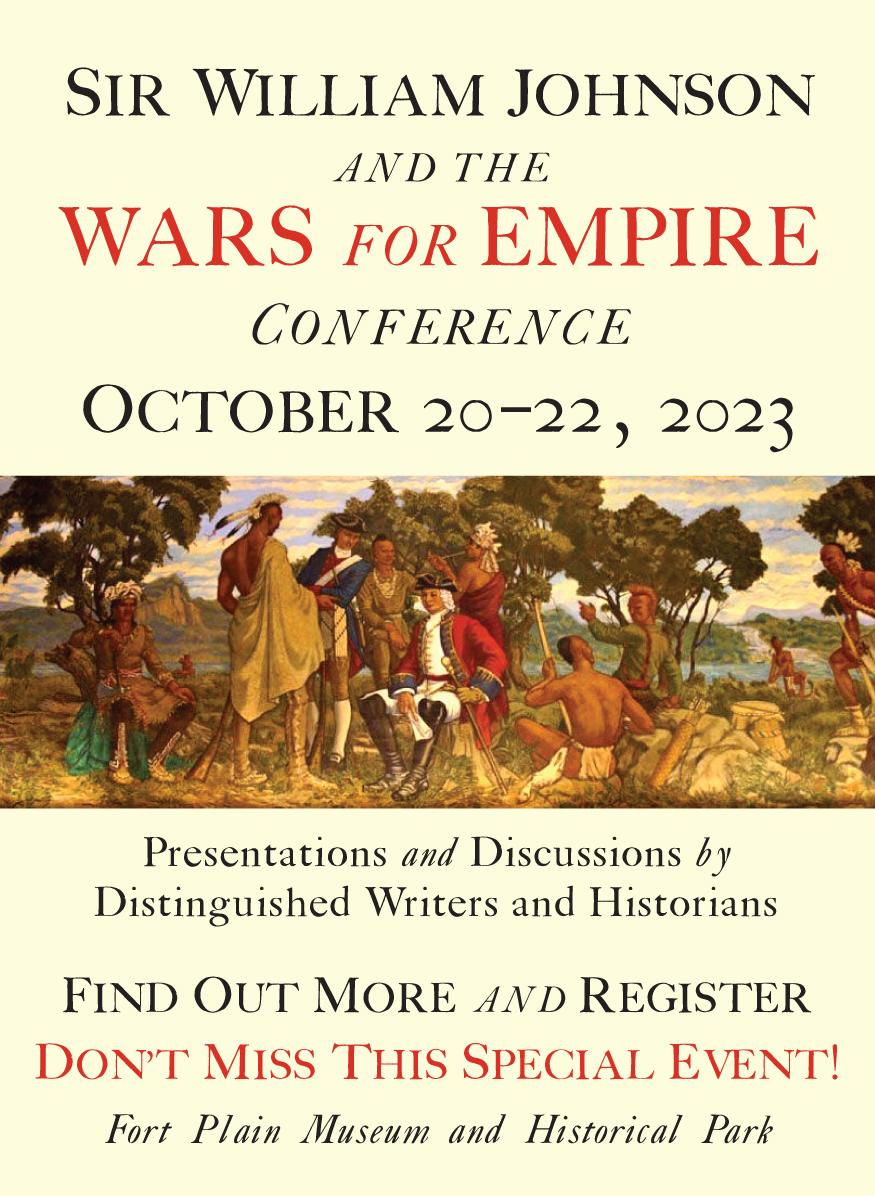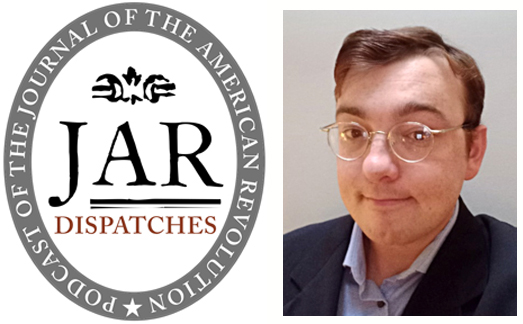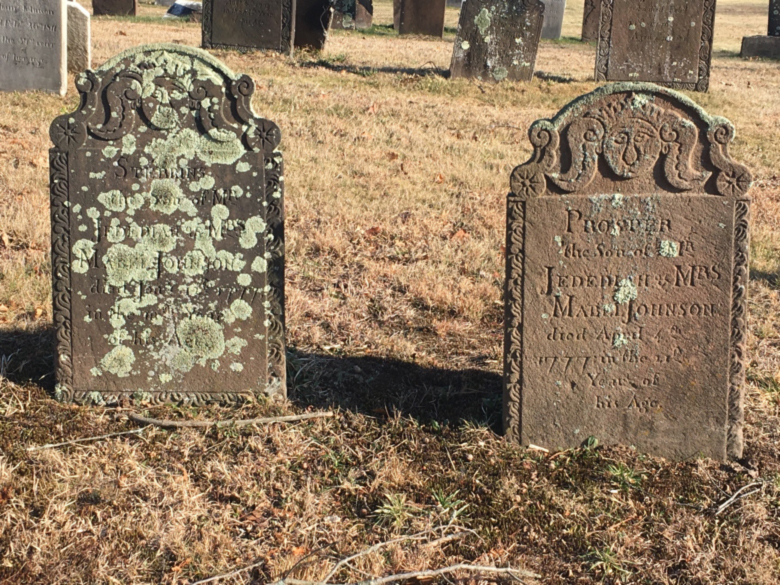In the May 30, 2016 issue of this Journal, Todd W. Braisted introduced us to General Enoch Poor of New Hampshire, his death, and burial. The story is here continued.
On September 9, 1780, Lt.-Col. Henry Dearborn of the 3rd New Hampshire Regiment recorded that “this evining ye Honbe. Brigadeer Genl. Poor departed this life after labouring under a severe bilious fever 13 days, very universally lamented by the Genls. & other officers of the army.” The same day Second Lieutenant Pennington of the 2nd Artillery made the notation that “Last Night Died B. General Poor of a Short Illness he is much lamented by all ranks in the Army as he was a Brave Office and a worthy member of Society—” General Jedediah Huntington wrote from Paramus on September 11 that “Yesterday we buried one of our valuable Generals (Poor) who was sick but a few days with a bilious Fever—the funeral solemnity was very handsome & honorable to the deceased.”[1]
Writing at “Camp, New Jersey” on September 17, Major Joseph Bass, who was Commissary and Clothier for New Hampshire lamented:
On the 8th inst. at night, died the worthy Gen. Poor, of a putrid nervous fever: very much lamented by all ranks in the army; and on the 10th he was buried at Hachinsach with all the honors of war. His funeral was attended by his Excellency Gen. Washington, the Marquis and all the principal officers of the army; in fact there was every respect shown this good man, and he was deserving of it all. In him may be truly said, was united the christian, the soldier, the gentleman. The army has lost a good officer: our Brigade in particular will feel the loss of him; for he was like a father, both to officers and men. He did honor to the State he came from. His funeral was the grandest I ever saw in this way. I pity his poor wife and family.[2]
Capt. Henry Sewall of the 12th Massachusetts wrote, “BGenl. Poor died of an intermitting fever in Camp. In him the public lost a very valuable officer.—But a fortnight ago he was acting in the field!” Yet anothertribute was written by Chaplain Enos Hitchcock: “Last night departed this life of a putrid fever, Brigadier Genl. Poor, whose uniform life—agreeable deportment—intrepid & determined spirit united to a placid, generous, disposition rendered him at once & equally serviceable to the public and agreeable to his Friends & acquaintance—his death is therefore very greatly lamented by them all—perhaps no Officer of his rank in the army would receive of more general Tribute than he.”[3]
Poor’s home state newspaper ran a tribute to him:
EXETER, September 23.
Lately died at Camp, the Hon. Brigadier-General POOR, of the New-Hampshire line of the Grand Army of the United States:—He was much esteemed in his Military Life, as an able and enterprising General in whom was placed the entire Love and Confidence of his Officers and Soldiery. In his private Life he was justly admired as a Gentleman of great Probity, a tender and affectionate Husband and Parent; he has left, in this Town, a Consort and three Children, (with his grateful Countrymen) to bemoan his Fate. Previous to his death, he was promoted as second in Command of the Light Corps of the Army, under the Marquis de la Fayette.[4]
The news of Poor’s death spread. Several newspapers carried the story. In Boston Major General Heath Major General William Heath heard on September 14 that “Intelligence was received that Brig Gen. Poor, of New Hampshire, died at camp on the 8th, of a putrid fever.” A Connecticut newspaper reported “A Letter from an Officer in Camp near Hackensack, dated the 9th instant says, “Last Night at 11 o’clock died Brigadier-General Poor, of the State of New-Hampshire, of a bilious Fever, after about eight Days Sickness.”[5]
The funeral was well attended and recorded. Colonel Dearborn noted: “the remains of Genl. Poor was Interd at Hackinsack, attended by his Excellency Genl. Washington all the Genls. & most of the other officers of the army, together with a Regt. of Infantry, detachments of Cavelry, Artillery, with a band of musick. the prosession was truly Solemn & well conducted. the death of so valuable an officer as the Genl. is a very great loss to the army & to his Brigade in particular.”
Massachusetts Chaplain Joel Barlow wrote home that:
Yesterday the funeral of General Poor was attended with great solemnity and military parade. All the officers of the army—perhaps five hundred in number—with a regiment of infantry and a regiment of dragoons, marched in procession, with a large band of music playing the funeral march. In the first rank the deceased general’s horse was led with the usual trappings, his saddle and holsters, and boots fitted in the stirrups with no rider. In this situation the horse was a perfect picture of bereavement, and the most striking object that could be imagined; then followed the corpse with his sword and pistols hanging on the coffin, then the particular mourners, the two regiments, the officers, beginning with the juniors, while His Excellency closed the procession, which was about a mile long and extremely slow. Parson Evans gave us an oration at the grave, and there were the last honors paid to an exceeding worthy character.”
Chaplain Hitchcock led the procession:
This afternoon were interred the remains of Genl Poor—the procession began about a Mile from Hackensack Churchyard—The Brigade of Light Infantry he commanded—march in front with Arms reverst—Lees corps of Light horse followed them—a band of musick next—Mr. Evans & I preceeded the herse—Brigadier Genl. Bearers—the Officers of the N. Hampshire Brigade followed—His Excellency, the Major Genls. succeeded—the most of the Officers of the Army formed a very long procession—Mr. Evans delivered an Oration at the grave suitable to the solemn occasion —[6]
An unidentified officer wrote home:
EXETER, October 7.
Extract of a Letter from an Officer in the Army to his Friend in this Town.
In my last I gave you the particulars of General POOR’s death, on the morning of his Interment; what followed, I now give you,—We removed him from Paramus, where he died, to Camp near Hackinsack, and put him in an elegant black-walnut coffin; at four o’clock P. M. the procession began, which was as follows:
-
- The whole brigade of light-infantry, fifes and drums, and a compleat band, playing alternately a dead march.
- The artillery annexed to his brigade.
- A body of cavalry.
- The chaplain.
- His riding-horse in his usual caparison, with his boots and spurs fixed hanging a-cross the horse reversed, led by his servant.
- The corps, his pistols and sword on the coffin.
- All the officers of his old brigade.
- All the officers of his new brigade.
- Almost every officer in the army.
So grand a procession never known in our army. The corps[e] was then carried to Hackinsack burying-yard, and deposited in the highest place; a town of some note and much beauty; six brigadiers were pall-holders. An oration was delivered at the grave by Mr. Evans, brigade chaplain. The whole was conducted with the greatest solemnity, and scare a cheek was seen from the Commander in Chief to the private centinel, without the ‘sad vestiges of grief.”[7]
A few months after the general’s death an inscription was proposed for his grave, but never implemented:
EXETER, November 27.
The following was designed to be inscribed on
General POOR’s Grave stone, at Hackinsack.
To the Memory of ENOCH POOR,’
Citizen of the State of NEW-HAMPSHIRE,
Brigadier-General in the Army of the UNITED-
STATES, who after five year’s faithful military
service, died the 8th of September, 1780,
aged 43 years.
Far hence the gorgeous pile. A simple stone
Thy Name, O POOR, shall better consecrate.—
Let arches rise to wealth and pride,
Thine is a worth that needs no ornament.
If martial qualities can claim regret
And in they breast their rugged lines, softened
By the social virtues, surely merit this.
If for those rights thy county long has bled,
You early trod the field o’archarg’d with war,
Demands the tear, they country owes thee many.
Here shall the Hind, at hour of labour’s close,
With grateful tread conduct his progeny,
And as the mind recalls these times, a sigh
Shall say—POOR toil’d that we might reap at safe.
And thou, light-footed Freedom, oft shall come
To read the Name of POOR, who for five Years
Fought ’gainst thy foes, to fix thee here on earth.
—Thou shalt bless his name-nought all praise but thine.[8]
Did General Poor die from the effects of a duel? Mr. Braisted speculates that the profusion of duels may have confused Elijah Fisher who wrote that Poor died after a duel. But one who should have known the facts, Lt.-Col. David Humphreys, then an aide-de-camp to George Washington, clearly separated events:
Three Duels have lately been fought, in which two of the Parties concern’d have been kill’d & three wounded—The Gentlemen kill’d were Bill Livingston of Baskenridge, & Lt Peyton of Moylans—Several More, now on the Carpet are inevitable—so you can see what a passion we have for fighting—What a pity it can not be gratified on the Common Enemy.—Genl Poor who Died of a fever is to be buried this day—The Army in general is healthy, in a very unusual degree—more so than for the two last Campaign[s.]”[9]
Other than Fisher, an 1832 pension deposition is the earliest reference I have found to a duel actually occurring. Benjamin Warner had been drafted for six months service into Colonel Lamb’s 2nd Continental Artillery. “his officers were Captain William McClure [James McClure was a captain-lieutenant in the 2d Continental Artillery], one Porter had been captain but after killing General Poor he was arrested.” Capt. Andrew Porter, later promoted to lieutenant colonel, would be the man Warner referred to, but the name Porter is first introduced here. There is no arrest record for any officer named Porter around this time. Warner claimed to be in the 2nd Artillery, the unit of Lieutenant Pennington who, as mentioned above, stated that Poor died “of a Short Illness.”[10]
The duel rumor undoubtedly originated in 1780. In early 1781 Capt. Jeremiah Fogg, a Harvard graduate and former aide-de-camp to General Poor, thought it necessary to refute the rumors:
Messi’rs PRINTERS,
As a Report has been spread thro’ this State, that the late Brigadier General POOR died of a Wound received in a DUEL, the following Deposition may serve to prove the Falsehood of said Report, and undeceive those whose Credulity has thereby been imposed upon and misled; and by inserting it you will oblige many of his Friends.
I JEREMIAH FOGG, late Aid-du-Camp to Brigadier-Gen. POOR, deceased, testify that for some Months before his Death I lived with him, attended him constantly during his last Sickness, [till] his Death, which I think was solely occasioned by a Bilious Fever, after thirteen Days Illness; that I assisted in laying out his Corps, and did not perceive that he had ever been wounded, and never knew or suspected he had ever been engaged in any Duel; nor heard any such Report till some Weeks after his Death, it was mentioned to me in a Letter from New-Hampshire.
JEREMIAH FOGG.
Rockingham, Ss, January 13th, 1781.
Capt. JEREMIAH FOGG made solemn Oath to the Truth of the above Disposition by him subscriber, before
Wm. PARKER, Justice Peace.
Fogg is quoted as also writing that “My general is gone. A cruel, stubborn fever has deprived us of the second man in the world.”[11]
In the nineteenth century various writers claimed Poor was killed by a French officer, or by Maj. John Porter Jr. For example: “It was reported that he died of an attack of bilious fever, but this was not true. He was killed in a duel with a French officer, and the falsehood as to the cause of his death was promulgated as a matter of public policy. Gen. Poor was so beloved by his troops, and so popular with the army generally, that if the cause of his death were known, a fearful collision might be the consequence betwixt the American and French troops. The truth as to his death was not promulgated until after Lafayette’s last visit to America, and is not now generally known.”[12]The other story “holds that Poor, who was known to be a demanding leader, instructed Major John Porter of Bridgewater, Mass. on one hot August day to rouse his resting troops and have them continue marching. The recalcitrant troops stayed seated and Poor had to repeat the command, to which Porter responded rudely. In the follow up exchange, Porter challenged Poor to a duel.” Finally in 1921, the Journal of American History published a report in which no duel was mentioned.[13]
However the duel story has persisted into this century. The website of the New England Historical Society has a story entitled “The Mysterious Death of New Hampshire’s Enoch Poor” which concludes “the story remains unresolved to this day.”[14]Even the founders.archive.gov short bio on Porter claims, “Porter’s reputation had been tarnished when he was relieved of his command after mortally wounding Brig. Gen. Enoch Poor of New Hampshire during an August 1780 duel.”[15]There is no evidence of this removal and Porter remained with the army until late 1782, when an unauthorized trip to Europe led to his being court-martialed and discharged from the army on October 12.
This writer believes that the facts prove beyond a shadow of a doubt that General Poor died of disease, a “fever/putrid fever/severe bilious fever/putrid nervous fever” as stated by seven men who were with the army on the spot, in particular Jeremiah Fogg who was Poor’s aide-de-camp. While the stories of a duel with a French officer or Major Porter are interesting to read, the primary evidence presented by seven American officers, plus the deserter account in Mr. Braisted’s article, far outweigh Mr. Fisher’s account. Given the great affection that General Poor was held in, “beloved by his troops, and so popular with the army generally” the duellist who killed him, French or American, would have been fortunate so see many more sunrises.
[1]Henry Dearborn, Revolutionary War Journals of Henry Dearborn 1775-1783, ed. Lloyd A. Brown and Howard H. Peckham (Chicago: The Caxton Club, 1939): 202-203; William A. Ellis, ed. “The Diary of William S. Pennington,” Proceedings of the New Jersey Historical Societynew series 63 (1945), 213; Jedidiah Huntington to Jeremiah Wadsworth, September 11, 1780, The Morgan Library & Museum, MA 558.51.
[2]Joseph Bass to Col. Joshua Wentworth, 17 September 1780, “Revolutionary Reminiscences,” The Portsmouth & Great-Falls Journal of Literature & PoliticsVolume 48, Issue 51, (December 23, 1837), 1.
[3]Henry Sewall Diary, Massachusetts Historical Society; Diary Of Enos Hitchcock, D. D., A Chaplain in the Revolutionary Army. With A Memoir. Edited by William B. Weeden, Providence, 1899, 223.
[4]The New-Hampshire Gazette; or, State Journal, and General Advertiser, September 23, 1780.
[5]William Heath, Heath’s Memoirs of the American War: Reprints From the Original Edition of 1798, With Introduction and Notes By R.R. Wilson(New York: Wessels, 1904), 265; Connecticut Journal, September 21, 1780.
[6]Dearborn, Journals, 203; Joel Barlow to Abraham Baldwin?, September 11, 1780, Charles Burr Todd, Life and Letters of Joel Barlow, LL.D. Poet, Statesmen, Philosopher …(New York: G. P. Putnam’s Sons, New York 1886), 32; Hitchcock, Diary,222-23.
[7]The New-Hampshire Gazette; or, State Journal, and General Advertiser, October 7, 1780.
[9]David Humphreys to Jeremiah Wadsworth, September 10, 1780, Photocopy, William A. Oldridge Collection, Box 1, Library of Congress. Original shown to be at Henry E. Huntington Library.
[10]Deposition, August 10, 1832, Benjamin Warner Pension File, (S15788).
[11]The New-Hampshire Gazette; or State Journal, and General Advertiser, January 15, 1781; Samuel Collins Beane, “General Enoch Poor,” Proceedings of the New Hampshire Historical Society, 3, 1895-1899, 465.
[12]Potter, C. E. Military History of New Hampshire,[n.p.: 1866], 340.
[13]Ellis Ames promugates this story in “Duel of Gen. Poor with Major Porter,” Proceedings of the Massachusetts Historical Society19 (1881-1882), 256-261. It is largely refuted by Samuel Collins Beane, “General Enoch Poor,” Proceedings of the New Hampshire Historical Society, 3 (1895-1899), 435-472; Henry R. Baker. “General Enoch Poor,” The Journal of American History, 15 (1921), 117-132.
[14]www.newenglandhistoricalsociety.com/…death-new-hampshires-enoch-poor-revolutionary.
[15]www.founders.archives.gov/?q=%22John%20Porter%22&s=1111311111&sa=&r=1&sr=














One thought on “A General’s Funeral: The Burial of Enoch Poor Revisted”
Poor’s grave is still well maintained, in a churchyard across the street from the impressive Bergen County Courthouse.